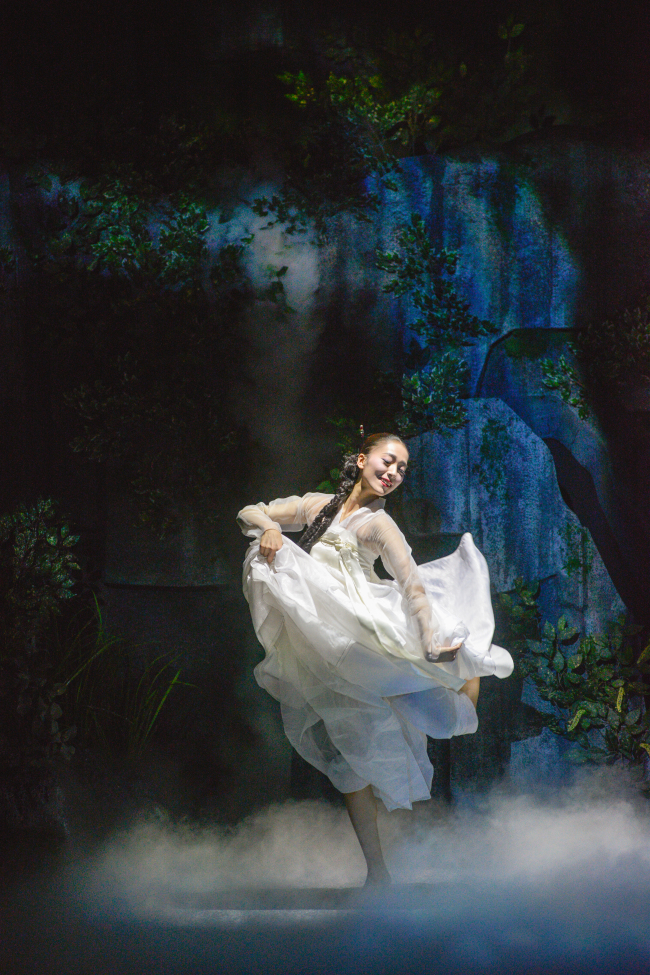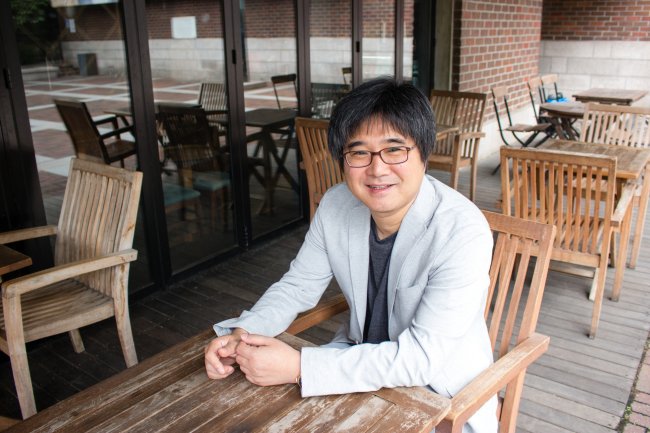Jeongdong Theater, established and run by the government, has a clear mission: to introduce Korea’s traditional arts to foreign visitors.
Tucked away behind Deoksugung Palace in Seoul, the small theater with 250 seats has been mounting traditional arts performances every day for the past 17 years.
On Sunday, it celebrated its millionth audience member, a milestone in its devoted history since its foundation on the historic site of the country’s first Western-style theater.
In an interview last week, the theater’s general director Jeong Hyun-wook laid out an ambitious goal for another 1 million spectators.
“The next 1 million mark may not be in the distant future. It may be reached surprisingly fast,” he said.
The official, who took the helm of the theater last June, is betting on opportunities overseas, after he recently showcased the theater’s ongoing production of “Miso: Baebijang-jeon” in front of Chinese theater professionals and general audiences.
 |
A scene from “Baebijang-jeon.” (Jeongdong Theater) |
The show, a dance drama based on a traditional folktale of the same title, had an enthusiastic reception in China, he said. Many of the audience members who were surveyed after the show said they were willing to pay to see it once again.
“Next year, we’re bringing the production on a tour of Southeast Asia and China. We’ll be stopping at cities like Kuala Lumpur for a couple of days’ performances,” he said.
The tour is a pilot project as the theater seeks to turn itself into a “mobile theater” that goes beyond its physical limit ― the 250-seat facility in Seoul.
“Jeongdong Theater should be like the base camp of the Korean Wave of traditional arts,” Jeong said. “For this, we’re not going to just sit and wait for people to come. We’ll go searching for them.”
 |
Jeong Hyun-wook, general director of Jeongdong Theater. (Jeongdong Theater) |
Since its foundation, Jeongdong Theater has been exploring the possibilities of Korean tradition, trying to retell it in the form of a high-quality stage work that both contemporary Koreans and non-Koreans can enjoy.
“Baebijang-jeon,” for example, takes its plot from a Korean folktale and mixes various traditional elements such as dance, music and dress, but the final product has a universal charm and appeal, Jeong stressed.
The key is how to incorporate modern theatrical elements and public taste, he added.
That, however, doesn’t mean that his theater sacrifices artistry for public success. On the contrary, it wants to set the example of how a tradition can be reborn as a modern high art, he added.
“‘Baebijang-jeon’ has a cast of about 25, all of whom belong here. There’s also an orchestra playing live at every performance,” Jeong stressed. “I believe that there are plenty of foreigners and locals who want to see a decent Korean show even for a price.”
Tickets for the show run from 40,000 won to 60,000 won ($39 to $58).
Jeong, before joining the public theater, had been active in the children’s theater movement, running Sadari Theater Company since 2001.
Making use of his past experience, the director plans to produce a children’s show next year to be staged at the theater’s auxiliary hall, which has so far been lent out.
“Just like ‘Baebijang-jeon,’ the children’s show will be based on traditions and staged twice a day on an open run,” he said. “We’re planning various other programs to expand our role as a public theater. One of them aims at supporting independent artists who experiment with traditions.”
Jeongdong Theater is currently running two shows ― “Baebijang-jeon” in Seoul and “SILLA: Songs in Praise of Giparang” in the historic city of Gyeongju, North Gyeongsang Province.
The Seoul show is staged at 4 p.m. and 8 p.m. every day except Mondays, with English, Japanese and Chinese subtitles. For more information, visit www.jeongdong.or.kr or call (02) 751-1500.
By Lee Sun-young (
milaya@heraldcorp.com)









